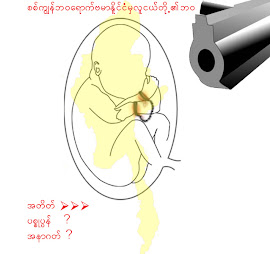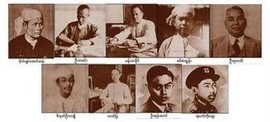Two monasteries in Sittwe defy junta orders
However, two monasteries in Sittwe have refused to follow the directives and have not told the monks to go.
The two monasteries are Myoma Kyung and Laraung Won Kyung, located in downtown Sittwe. Each monastery has about 100 monks in residence studying Buddhist scriptures, a town elder said.
On the contrary, abbots from the two monasteries have allowed monks from other monasteries to stay, should they be in need of accommodation in the city after being forced to leave for their home towns.
The abbot from Myoma monastery was summoned last week by the army authorities to the state SPDC office and was asked to follow the government's order, but the abbot continued to refuse, a monk source said.
Despite this act of defiance, the authorities are yet to arrest the abbot, who is the former chairman of the Rakhine State Monk Council.
Many monks in Sittwe left their monasteries to return to their native villages after the order was issued by the authorities, but some monks have chosen to stay at the two monasteries in defiance of the military's orders.
.....................................................................................................
Pressure on Beijing will bring down Burmese junta
Burma was once one of the most promising nations in Southeast Asia. After World War II, it was the world's leading rice exporter, with a strong economy, high enrollment in primary and secondary schools, and an elected government. U Thant, a Burmese official, served as United Nations secretary-general from 1961 to 1972. In recent decades, however, military rulers have turned what was once a jewel of Asia into one of its most miserable places through repression, mismanagement and corruption and taken the country in a tragically different direction.
Burma's military leaders have presided over an enormous economic decline. The level of poverty and hunger means millions of families having no more than one meal a day. Once known as Asia's rice bowl, today Burma cannot even sustain its own people - with just $200 in per capita income, Burma today is an economic basket case. One third of the population is malnourished or physically underdeveloped. Yet the top 14 military officers who form the junta live in luxury in the newly built capital city - Naypyidaw - carved out of the jungle, 320 kilometers north of Yangon. Much of the generals' income derives from bribery, corruption and drug trafficking.
Politically, the junta has maintained a vise-like grip on this impoverished nation through psychological and physical terror. The nation has an estimated 1,200 political prisoners, including leader of the nonviolent movement for human rights and democracy in Burma and Nobel Peace Prize winner Aung San Suu Kyi. And Burma has one of the worst records of human rights abuses in the world, including the systematic use of torture, forced labor and violent national oppression. Transparency International's 2007 Corruption Perceptions Index, which scored 180 countries, has ranked Burma as the most corrupt nation in the world.
Since 1988, the United Nations has adopted 28 resolutions condemning Burma. And last month, President Bush took center stage at the United Nations General Assembly and announced to the world his decision to slap new economic sanctions on Burma and called "every civilized nation has a responsibility to stand up" to Burma's repressive regime.The current showdown between thousands of Buddhist monks and more than 100,000 civilian demonstrators and the military rulers in Burma is the largest demonstration against military rule since the brutal crackdown on pro-democracy protests in 1988 - more than 3,000 unarmed civilian demonstrators were killed during the 1988 protests.
The enormous demonstrations in Burma in recent weeks may have surprised the world, but the scene in Yangon is surely familiar. The entire episode is reminiscent of the "people power" uprisings in the Philippines and China in the 1980s and Indonesia in the 1990s. Hundreds of thousands of people in the streets demonstrating against a ruthless dictatorship is one that has been repeated all over Asia.
With the junta now facing the biggest threat to its existence since the revolutionary events of 1988, the question is: will the protesters in Burma actually succeed in peacefully overthrowing the military regime, or are the marching monks and demonstrators in for a bloodbath?
In 1988, the international community had hoped Japan - then Yangon's biggest patron would pressure the regime to listen to its people's demand. Today all eyes are on China, Burma's most important trading partner, investor, strategic ally and biggest arms supplier. In recent years, China has pumped billions of dollars worth of aid into Burma. Burma has become a critical outpost in China's "string of pearls" strategy in the Indian Ocean and near the Malacca Straits, through which four fifths of Beijing's oil imports pass. Energy-hungry China has also been jockeying for a share of Burma's vast energy resources and is eager to import energy from a country that has proven natural gas reserves of 0.54 trillion cubic meters.
What leaders in Beijing also want is a virtual return to Burma's traditional status as a "vassal state" on China's periphery. For that purpose, China has consistently thwarted attempts to put pressure on Burma's rulers, and in 2007 alone, China twice vetoed U.N. Security Council resolutions condemning the junta. Unless China is willing to join the international community in supporting the aspirations of the Burmese people and to tell the Burmese junta to cease using force on its own people, it is highly unlikely that international sanctions will have any real impact on the illogical, opaque and truculent military junta in Yangon or would lead to a Burmese replay of the so-called "color revolutions" that toppled dictators from Ukraine to Kyrgyzstan.
But Beijing also has its Achilles' heel - the Chinese authorities are paranoid about anything that might tarnish the 2008 Beijing Olympics. So this is the perfect time to squeeze Chinese leaders to drop the junta in Yangon. After all, Beijing's biggest nightmare is having next year's game dubbed the "Genocide Olympics."
By; Dr. Xiaoxiong Yi is a professor at Marietta College and director of the China Institute.













6 comments:
Now it is OUR time to start with the petition to boycott the
2008 Olympic Games
Please sign the petition at
Avaaz.Org - Sign the Petition to boycott the 2008 Olympics
http://www.avaaz.org/en/
thankyou...
Burma Foreign Minister resigned in London over the Monks cruel treatment.
http://paraussies.blogspot.com/2007/10/diplomat-resigns-over-burma-monks.html
I have signed the petition... hoping it will help...
Please Burma try to hold on...
it is so easy for us to say "go on"... but it is so hard for Burmese to go on protesting, when people are killed and badly injured. I cry for them...
Where is help from UN? From Europe... i do not see it at the moment. What can we do to help ? More petitions...? please say us how we can help...
At this moment we all have to make sure that we are safe & stay alive.
That does not mean we have no activities. Have contacts with the people you can trust ( carefully watching them if you really can trust them.)
Do not believe everything you heard of.
WE WILL RESIST WITH UNITY AND DEFIANCE OF ORDERS.
To Win, we must stay alive.
THANK YOU Dr. Yi.
ko htike, thank you for all of your efforts to keep our country's issues in the spotlight... I am trying to do the same here in the states.... I unfortunately do not have any direct contacts in Burma as I left for the states when I was a child. I appreciate all of your hard work and efforts to keep the world informed.
love,
sophie
sophielwin.blogspot.com
Post a Comment